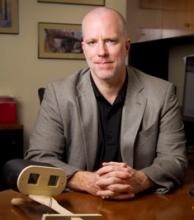
Dr. Williamson hails from a small, working-class family in Pittsburgh, Pennsylvania and was the first of his family to go to college. During our discussion, he recalled having no idea what he wanted to do when he was 19 except for his drive to receive an education and obtain a Ph.D. He did just that after his bachelor’s in Psychology, receiving a Ph.D. in psychiatric epidemiology (the study of the distribution of psychiatric diseases in a population and the risk factors that impact the distribution).
Over time he has migrated towards integrating preclinical models, brain imaging, biomarkers and genetics into his study of stress-related disorders. He defined himself as a translational epidemiologist and really struck a chord with me when he said, “in life you can call yourself whatever you like and become it”. Given a chance to go back in time, he said he would have enhanced his biology training as an undergraduate, however he advised not worrying “about fitting everything into an end-product that you imagine for yourself because in 10 years I don’t think you’ll find yourself in the position you’re imagining now”.
I love how Dr. Williamson’s current projects are very much a product of happenstance and seized opportunities. The project I’m involved with is sequencing the gut bacteria of mice pre & post a chronic social defeat paradigm (which induces a depression-like phenotype) to measure shifts in their microbiome. What began as Kara’s (an undergrad who now works in the lab) senior thesis and has now grown into one of the lab’s main focuses—a beautiful example of Dr. Williamson’s teaching style in which he likes to work with students one-on-one and “to learn together, teaching and being taught”.
Their second project is within a national PTSD consortium (partially funded by Veteran Affairs). Before moving to Duke, Dr. Williamson worked in San Antonio where a colleague approached him about taking on a genetic study of soldiers pre & post deployment to find biomarkers for PTSD susceptibility. The happy accident which started out as helping a friend has grown exponentially, and Dr. Williamson is now the director of the ‘Genomic and Biomarkers Core’ within the consortium. Although Dr. Williamson has been lucky both professionally and financially to be able to branch into new fields, he mentioned that allowing investigators to access money not tied to project-specific grants would help science move forward. Additionally, he would like to see more incentives for scientists to be unselfish and collaborative so that one’s life experiences can become the whole group’s knowledge.
The lab’s final project is a longitudinal teen alcohol and depression study for which Dr. Williamson’s epidemiological background has been critical. “Depression is not depression is not depression”, each individual’s depression is characterized by their family history, presence early-life anxiety, age of first onset, etc. and one must look at the disease in that framework. In the pursuit of better understanding these factors, he is following children with high-risk backgrounds during the peak onset period of 12-15 years old.
As a final piece of advice for aspiring scientists, he emphasized the importance of being generous, gracious and dependable as a collaborator and of giving more than one takes. “No one will help you if you’re a pain in the ass,” he said jokingly, but also with the wisdom of one who has dealt with such a colleague before.


